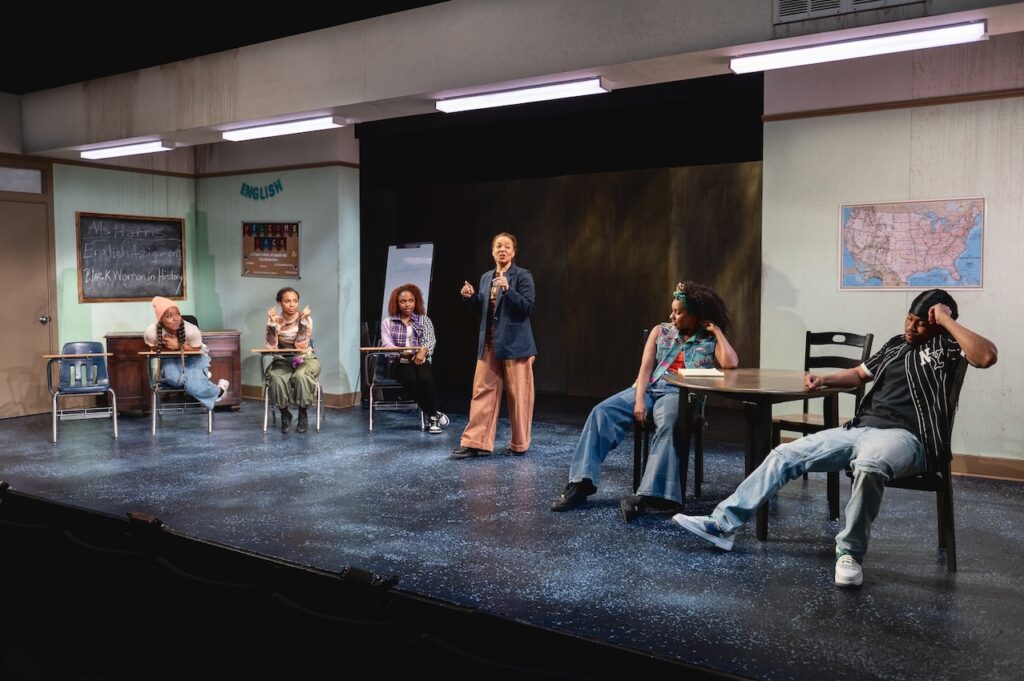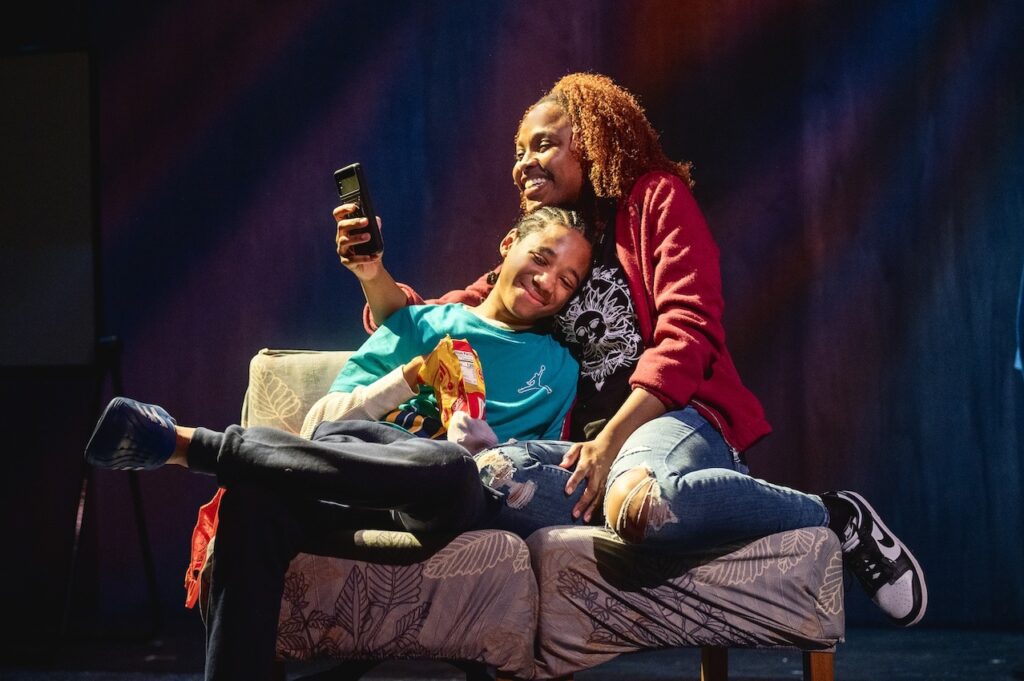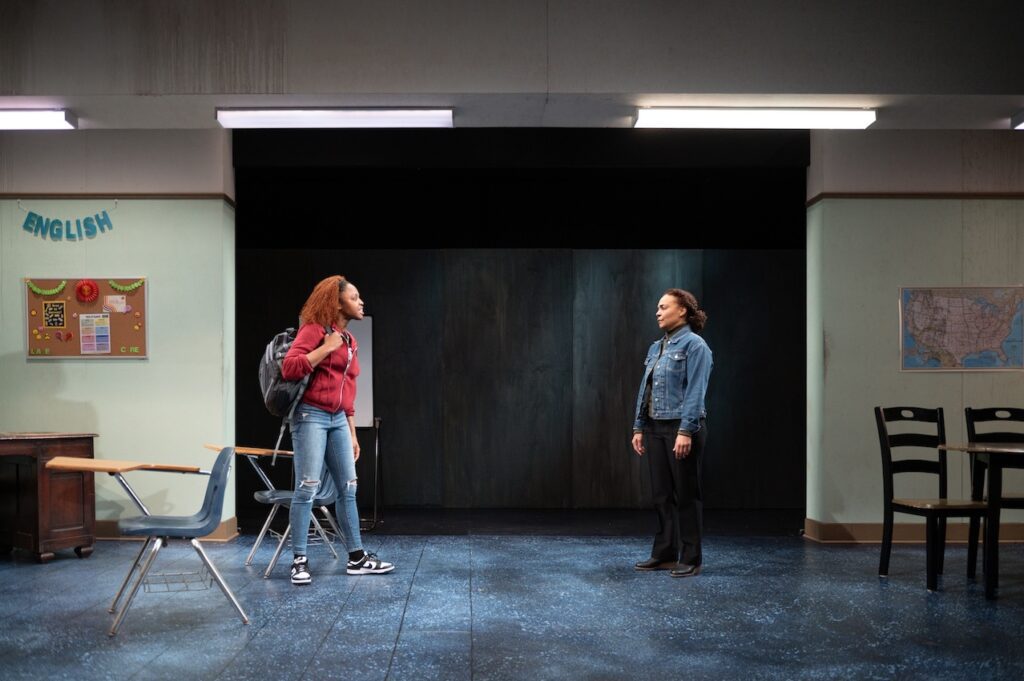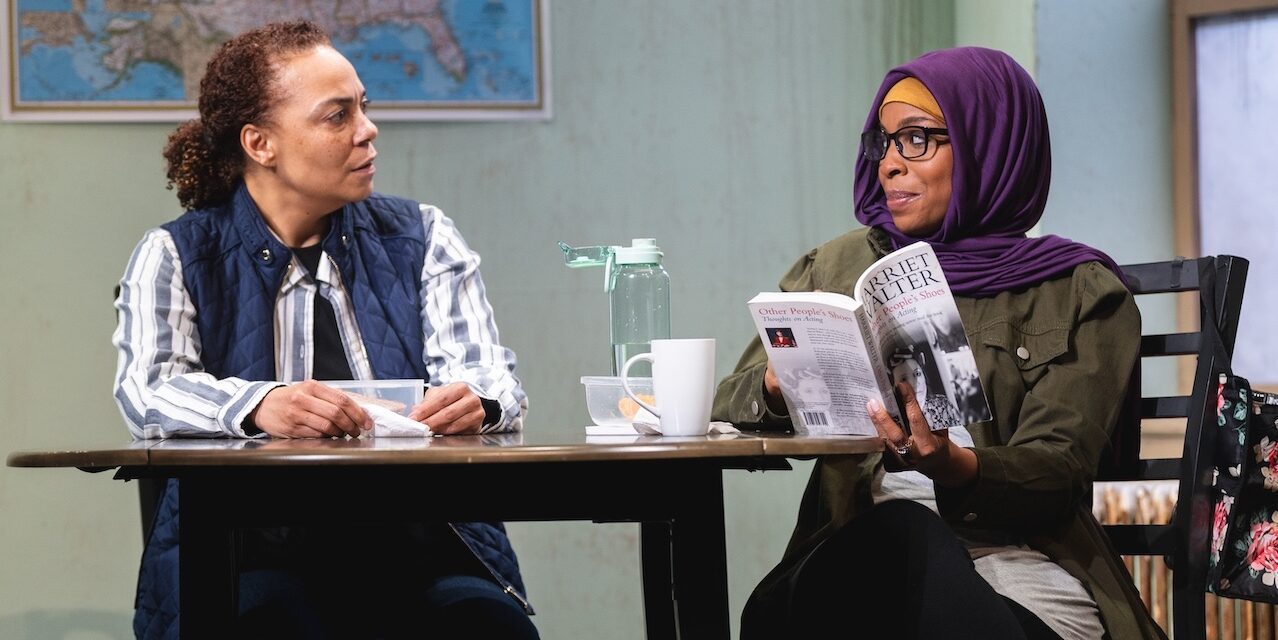Theater Review by Samuel L. Leiter . . . .
It’s too bad that James Wilson wasn’t able to include a discussion of Kia Corthron’s Fish—an initially appetizing but ultimately overstuffed new play about America’s broken education system—in his important recent book, Failure, Fascism, and Teachers in American Theatre: Pedagogy of the Oppressors. Prof. Wilson doesn’t specifically identify a category of plays in which dedicated educators help problematic students succeed, but Fish’s central relationship reminded me of works he discusses, like Emlyn Williams’s The Corn Is Green, representing those featuring idealistic spinster teachers.
No reference is made to English teacher Jasmine Harris’s marital status in Fish—a coproduction of Keen Company and Working Theater at Theatre Row—but everything about this indomitable, middle-aged Black woman says spinster. She certainly fits Wilson’s description of being “occasionally pitiable in her solitary professional existence and heroic in her single-minded devotion to her young charges” (8). In a note responding to a question I posed, Wilson also likens her to the title character in The Prime of Miss Jean Brodie, who is “First, last, and always . . . a teacher since we don’t have any sense of her beyond the classroom.”

Fish is set in a large, urban high school, perhaps in New York, where the school population is largely African American (New York is cited for its high level of segregated schools), and most of the students come from impoverished backgrounds. The sixth floor has recently been converted to a charter school called Peak and Pinnacle Academy, whose clean and attractive conditions, along with its access to computers and the like, contrast radically with the rundown lower five, with their broken plumbing, which have been seriously ignored because of budget cutbacks. Not only are there no computers, but the library has been closed, arts programs have been cut, and a nurse is available only on a reduced schedule. I don’t know how common it is to have such an arrangement of two such contrasting institutions in the same building, where students from each can interact, but if it’s true, it’s a horrible idea.
Seven actors play 17 roles in this episodic, 105-minute, intermissionless play, which begins with a group of girls riding the extremely slow elevator—intended only for disabled students—to the sixth floor. The girls’ names all begin with “La,” as in Latricia, LaRonda, Lakkayyah, and the like, but Latricia (a fired-up Torée Alexander) has shortened hers to Tree. She’s the only rider not in the charter school, which she views disturbingly when she goes past her floor; we’ll learn that she never applied for the lottery that placed the others there.
Tree is a trash-talking 18-year-old with a chip on her shoulder who shows no respect for Jasmine Harris (Rachel Leslie, formidable), the new English teacher replacing her predecessor in a revolving door job that only exacerbates the already unstable learning environment. Tree, threatened with detention for her misbehavior, thinks little of telling Jasmine, “I ain’t got no time for no detention, bitch!” Or taking revenge by cruelly exposing a scandalous secret of Jasmine’s to their class. Short of a martyr complex, why, we wonder, would anyone in Jasmine’s position want to subject themselves to such behavior—much less the kind of thoroughly disinterested students we’re shown—on a daily basis?


On the other hand, Tree can justify—to a degree—her perpetual fury, absences, and tardiness: her mother’s in jail for selling drugs (which she initially tries to hide), and she’s the sole caregiver for her asthmatic 11-year-old brother, Zay (Josiah Gaffney). If she stops going to school she’ll lose the public assistance she receives, which may make you wonder why she behaves so contrary to her own interests, regardless of how frustrated she feels. Would such a smart but desperately needy girl, for example, really destroy her phone in a fit of pique? Only on stage or screen, I think.
Playwright Corthron uses the clash between the rebellious student and the tough—she once taught in prison—but reluctantly pliant teacher, who wants to prevent Tree from failing to graduate, as an opportunity to excoriate the public school system. If you’ve got a family member working in public education (I’ve got two), you’ve probably listened to nonstop diatribes about the system’s flaws at every family dinner. Corthron uses her play to express her rage about a system in which affluent families can send their kids to private schools while poor ones must contend with public ones; where teachers not only are underpaid but provide learning materials at their own expense; where students travel long distances to and from school; where medical attention is dangerously insufficient; and where there aren’t enough Black teachers.
We also see how prepping for standardized tests wastes valuable time and how the tests themselves can lead to corruption; how students rarely pay attention, openly napping and texting (despite bans on cell phones); how, in the absence of school libraries, TikTok and Wikipedia are the principal research sources; and, despite only figuring in the plot when we hear about an anti-gun protest outside, how gun violence is plaguing our schools. It’s observed, by the way, that kids like these are more likely to get shot in the streets than in the schools, something more prevalent in white, suburban locales.


Fish—which takes its name from a proverb Jasmine mentions—has the air of a polemic, and it contains didactic speeches about teaching and other topics spouted mainly by Jasmine but, in one scene, with input from another dedicated teacher, Nabila Muhammed (Morgan Siobhan Green), who abandoned the orderliness of the charter for the regular school. “I never got comfortable passing all the have-not floors.” Someone else with a martyr complex? At such moments the play becomes overtly artificial, the speechifying sounding more academic than spontaneous.
Fish’s plotting, which includes a tragic incident and teen pregnancy, isn’t particularly original; some scenes—like a long one between Tree and Jasmine at the burger joint where Tree works—are forced; and Tree’s transition from resistant to resolved, while dramatically necessary, feels contrived. The same could be said for having Jasmine be not only an English teacher but a civics teacher, which also allows the play to introduce historical material concerning Black women. Ron DeSantis wouldn’t approve.
Adrienne D. Williams’s direction gets enthusiastically vivid performances from her talented cast, those with multiple roles displaying notable versatility, but her staging too often has her principals delivering their lines straight out to the audience rather than eye-to-eye. Jason Simms’s set suitably accepts the challenge of providing several simultaneous locales, including a classroom, apartment, teacher’s lounge, and elevator; Nic Vincent lights everything well; Mika Eubanks dresses the characters appropriately; and Michael Keck does well by the music and sound design.
Fish tries to cover too much territory in too short a time. If you don’t already know the territory, however, pay attention because you may learn something.
Fish. Through April 20 at Theatre Row (410 West 42nd Street, between Ninth and Tenth Avenues). www.keencompany.org
Photos: Valerie Terranova Photography


















